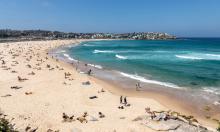The Uribe Myth of 'Democratic Security'
It is a country ruled by right-wing paramilitaries who continue to act with impunity. In collusion with the army and many politicians, they have displaced over three million people and continue killing the leaders of social movements.

By Paola Ramírez Orozco-Souel, in Le Monde Diplomatique Brazil
In the center of Bogota, at the entrance of a skyscraper watched by cameras, a security guard questions the mechanical floor, the reason for the visit, the number of the identity card and phone. In return, a badge is provided that allows passage in the hall and entitles a thorough review, culminating in access to the elevators.
On the 25th floor, further security does the same interrogation. Crossing two armored doors and an anteroom of surveillance, is the entrance of the offices of various organizations defending human rights, trade unions, political parties and independent bodies.
Why such caution? Is the "democratic security" policy of vigorous Colombian President Álvaro Uribe Vélez, in power since 2002, just a myth? Many judges, members of nongovernmental organizations (NGOs), trade unionists, journalists and politicians seem to think so.
According to Alirio Uribe, a human rights defender, only a privileged few - the elite and multinationals - are benefiting from the government. Furthermore, "all those who criticize the president's policy or oppose his regime are Satanized", if not killed.
On November 28, 2008, thousands of demonstrators, wearing white t-shirts with the slogan "Colombia soy yo" ( "Colombia is me"), parade in the main cities and capitals around the world (Paris, Madrid etc.). As usual, the protest, which had the implicit support of Colombian and explicit power of the national and foreign media criticized only one of the protagonists of the conflict: the guerrilla [1].
Interestingly, on March 6 of that year, a demonstration against state violence had not benefited from the presence of the spotlight or cameras.
"We marched to protest the mass graves, the massacres, murders, disappearances and displacements of populations. Already the idea was spreading that you had to show more solidarity with the hostages, and one in particular, than with the victims of the state and the paramilitaries," said Jorge Rojas, director of the Council for Human Rights and Forced Displacement (CODHES), a nongovernmental organization.
“We march to protest against the paupers' graves, the massacres, the murders, the disappearances and the dislocations of populations, so there was already propagated the idea of which it was necessary to appear more supportive of the hostages, and of one in individual, of which with the victims of the state and of the paramilitary ones”, explains Jorge Rojas, director of the Advice for the Human rights and the Dislocation forced (Codhes), a non-government organization.
More than 300 thousand people demonstrated in Colombia on March 06, convinced that civil society should not weaken "each time the paramilitaries or the president threaten," as one of the protesters expressed.
Hostility dialogue
As Jose Obdulio Gaviria, cousin of the late drug lord Pablo Escobar and adviser to President Uribe, qualified this expression as "a march sponsored by FARC," the Águilas Negras (Black Eagles), the new name of the paramilitary groups, uttered death threats against its organizers and participants.
A week later, six organizers of the march were killed. Ten unionists had the same fate over the month. The only consolation is that, despite not having "the same institutional support, economic and media power as the protests against FARC, the march broke with the unanimous plan to impose the idea that violence is only the from guerrillas," says one of his mentors.
Hostile to any dialogue with the armed opposition, since his coming to power, the head of state favored military action. Between 2002 and 2007, 13,634 people were killed, victims of political violence [2]. According to CODHES, of the total of 4 million people displaced by force since 1985, 3 million were under the Uribe government [3].
For the lawyer Sergio Roldán: "the peasants who refuse to cultivate the cocoa leaf are evicted to make way for drug traffickers." The population also have their crops wiped out by armed groups because the land is a source of commercial exploitation. President of CODHES, Marco Romero estimated at 6.8 million the number of hectares expropriated or sold illegally by corrupt officials."
The case of Choco region of the Pacific coast where African-Columbian communities live, is emblematic. Thousands of peasants were forced to flee the violence, abandoned their land to make room for the interests of industry groups nationally and internationally, "to mega-projects planned for the cultivation of the African palm tree used to make biofuels [4].
"The period of Uribe is the most repressive that our communities have ever known. It is very difficult to enforce our rights and territories recognized by the Constitution of 1991 and by international charters," says DanielMaestre, displaced from the Kankouano community.
Victims ofparamilitaries, guerrillas and the army - are involved in more than 60% of the cases, according to the National Indigenous Organization of Colombia (ONIC) - more than 1,200 indigenous people were murdered over the past six years. "The 'democratic security' killed more people than it helped," says Jairo Chicama, indigenous ethnic Embera-Katio [5].
More than 170 state officials already are involved in the scandal said the "parapolitics", are elected officials or from the circle of the President
Uribe has refused to admit the existence of a political conflict in a country that assists the internal war since the 1950s. The "terrorist threat" is sufficient as an explanation for it. To "pacify" Colombia, the army long collaborated with the paramilitaries indiscriminately facing peasants, students, trade unionists, human rights defenders, journalists and political activists.
The families of the victims of this conflict, which had placed all their hopes on the court hearings provided for by law known as' Justice and Peace, "adopted in 2005 to demobilize paramilitaries and shed light on their crimes, quickly changed their tone [6 ].
Gathered around the National Movement of Victims of State Crimes (Movic), they are fighting today against forgetting and impunity "premeditated" the president, who extradited to the United States 14 of the most powerful paramilitary leaders to be prosecuted for drug trafficking. In Colombia, accused of crimes against humanity, they could make revelations about their intolerable preterit alliances with the political class.
In any event, more than 170 state officials are already involved in the scandal said the "parapolitics" - the term for collusion between paramilitaries and politicians, whether elected or from the circle of the president. Among them, Jorge Noguera, the former right-hand head of state and director of the Administrative Security Department (DAS) [7], who was arrested (later released) for putting that institution in the service of the paramilitaries by sending a list of union leaders, university professors and opponents to be killed [8].
In addition, 36 deputies elected by the majority field and two former chairmen of the Senate are in prison, while another 65 at most follow the same under investigation. Paradoxically, said Ivan Cepeda, president of Movic, "these events make our job even more difficult, as the president defends the people connected to the paramilitaries and mafia. We are subject to them, 20 of our leaders have been murdered since 2005.
With the blessing of local elites
Notably in the states of Sucre, Antioquia and Cordoba, "for imposing a regime of terror, the 'paras' decide who will be the political representatives, university professors of universities, etc. In one of these areas is the property of the President, located in the vicinity of another, the paramilitary leader Salvatore Mancuso. We can say with certainty that all who live in the area or who know it know what is happening there. "
He said paramilitary structures would act in 22 of the 32 states in the country, with the blessing of local elites [9]. Even abroad, warns Cepeda, exiled victims or with refugee status are not safe. "Accused of belonging to the FARC, they are pursued by diplomatic bodies in Colombia."
Like the newspaper El Tiempo, a source of information to the press and foreign ownership of Vice President Francisco Santos and Defense Minister Juan Manuel Santos, the television networks such as RCN and Caracol serve as a sounding board for the power of propaganda. Needless to say, paramilitary zones, freedom of expression and political pluralism have disappeared.
However, Senator Gustavo Petro, the Alternative Democratic Pole (PDA), notes that "although we are all under threat of death and that we support this destructive momentum of the president, the leftist parties and opposition are living in cities. After all, it is difficult to kill everyone in the street or 'monitor' with a gun each person to vote. " This would explain, in part, the election of the mayors of the opposition in three major cities of the country - Bogota, Medellin and Cali.
If the expressions of peaceful resistance of civil society is growing, the fear of bloody reprisals remains. "With a government as authoritarian and intolerant as that of Uribe, the unarmed political opposition is in serious danger. He sees us as an obstacle to democracy," said Carlos Gaviria, president of PDA. Facing the attacks the President and the numerous assassinations of its leaders, this new party meets the left of the country.
Eager for a third term, the president clearly dreams of dismantling the Constitution of 1991. He managed to get an overhaul, not without allegations of vote buying of legislators in order to be reelected in 2006 [10].
According to Fernando Cifuentes, public prosecutor, "the methods of the President, the violations of the constitutional text and the 'parapolitics' disregard the fundamental principles of democracy. If it continues, we'll get to a totalitarian dictatorship. "
TheSupreme Court Justice has evidence and witnesses to prosecute the accused MPs, but instead of letting it do its work, Uribe attacks when he can.
According Esperanza Delgado, president of Asonal Valle Del Cauca, union of magistrates, "the Executive has a real push through economic and political. We work against the wall, and the independence of the judiciary is respected. "
The Supreme Court of Justice has evidence and witnesses to prosecute and convict the members of the 'parapolitics'. But instead of letting it do its job, the president attacks when he can. " In fact, Uribe ranks Colombian judges "putschist offenders, who make the game of warfare and terrorism."
"Such maneuvers," says Delgado, "endanger our lives and the credibility of our institution and our action. If the head of state makes a mockery of justice, imagine the criminals! ".
Last year, around the country strikes were called motivated by indignation of the servants of the judiciary. In September 2008, for 44 days, a national movement for independence of the judiciary and the revaluation salary mobilized more than 80% of the actual sector. Closed to any dialogue, the head of state replied by decreeing a state of emergency.
The army, the anonymous terror, neutralizes discontent. On the night of August 31, a bomb exploded at the Palace of Justice in Cali. In addition to killing four people, the attack destroyed several cases already referred to the sentencing of criminals. "We do not feel safe," witness a prosecutor. "The president was quick to say that it was a FARC attack. Nobody knows anything for sure. I had cases on drug traffickers, paramilitaries and politicians. The hearings were scheduled for next week. Now I have nothing else, my office was completely destroyed. "
For the unions, the war against "terrorism" is intended to mask the fiascos of power: rising unemployment, an economic downturn, 70% o poor and an increase of 27% of the coca leaf plantations [11].
In this context, will Uribe initiate a series of discussions or negotiations with the armed opposition?" Without FARC, his policy would make no sense. He needs to keep the terrorist threat to justify their measures of 'democratic security', military spending (6% of GDP) and lack of social investment," said union leader Luciano Sanin.
Accused by the president of "destabilizing the state," the union leaders feel more threatened than ever. "The political culture of Colombia has always refused the unions, but is the first time we have a regime as repressive and liberal," adds Sanin. According to the National School of Unionists (ENS), 2,684 trade unionists were murdered in 22 years, including 463 during the two terms of President Uribe.
Exposing one's life and his family, the Colombian trade unionists are engaged in a suicidal activity in fact. "I need to hide, protect my life and the lives of my children, I change every time my house is ransacked and receive death threats," narrates a leader. "For my family, being a trade unionist is the worst thing that can happen to anyone in this country."
For women, the savagery that they support "goes far beyond the forms that characterize political violence," analyzes Pilar Rueda, a professor at the University of Salle. "They are stabbed to look like a crime of passion, are victims of sexual abuse, forced labor and 70% of the homeless population." In other words, concludes Rueda, under the pretext of fighting the guerrillas, "the paramilitaries fought an unarmed civil society.
With no guarantees to defend their rights, the peaceful struggle of Colombian society, which wants to build a true democracy in a country at war, is like a bet. However, the country is brimming with individual and collective initiatives encouraged by the hope of one day, the support of the international community.
"We can not compete with the media, guns, money or power," said Lilia Solano, a defender of human rights, "but we can persevere in our struggle. I do not know if we were hit by a collective madness, but we will follow the resistance."
NOTES
[1] mobilization, however, was much weaker than the demonstration held in support of the hostages on July 20, attended by 4 million people.
[2] The NGOs accuse the state in Colombia "[the] most human rights violations", Le Monde, September 27, 2008.
[3] Something around 305 thousand people were victims of forced evictions in 2007, and about 270 thousand during the first half of 2008. Amnesty International, "les civils pris pour cibles dans le conflit armé interne, Paris, October 28, 2008.
[4] El Nuevo Herald, Miami, October 15, 2008.
[5] According to ONIC, 1.3 million Indians - 102 people with 64 languages, representing 4% of the population - 45% do not have territory, 80% live in extreme poverty and 54 thousand were displaced by violence.
Translated from the Portuguese version by:
Lisa KARPOVA
PRAVDA.Ru
Subscribe to Pravda.Ru Telegram channel, Facebook, RSS!





